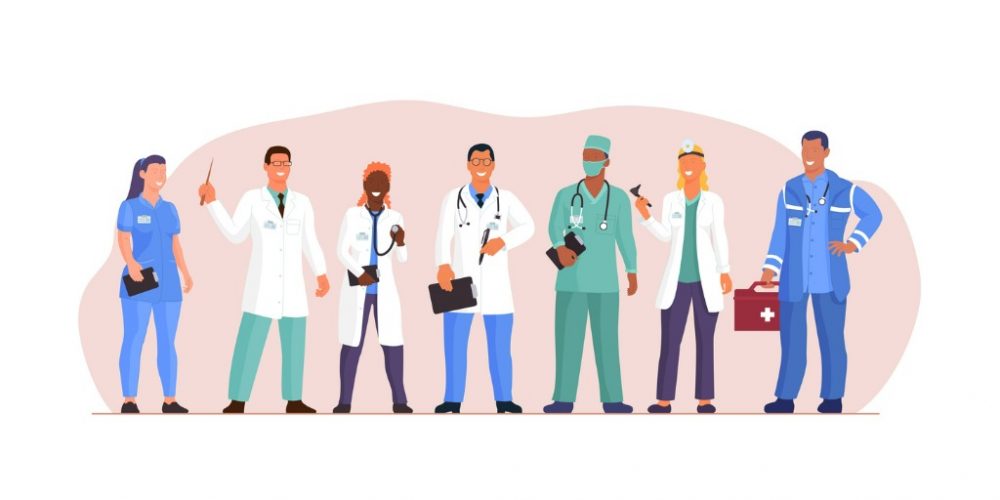More than 20 million Americans work in a health profession, including most of ASHA’s membership! There’s no better time to pay tribute to ASHA’s health professionals than during Health Professions Week, November 4–11.
Although Health Professions Week typically focuses on educating students about the many rewarding careers in health, this year, we’re also acknowledging common issues that health professionals face and highlighting new research on how to tackle these issues head-on to help professionals thrive. We hope you enjoy the articles below and find some helpful tips to use or share!
Focusing on Future Health Professionals
Identification of Gaps in Training, Research, and School-Based Practice: A Survey of School-Based Speech-Language Pathologists: This survey of school-based speech-language pathologists (SLPs) focused on training and education that most and least prepared them for their future careers. This information can help educators better design training and resources for future SLPs in the schools.
Student Stories: Microaggressions in Communication Sciences and Disorders: ASHA is committed to ensuring that future audiologists and SLPs better represent the diverse cultural makeup of the United States. One way to support students from historically underrepresented groups in communication sciences and disorders is to better understand their perspective—including, often, the struggles that they face. This article focuses on the stressors that these students face from clients, peers, and faculty—and how educators can help build more supportive and inclusive environments for them.
First-Year Graduate Clinicians’ Perceptions of Synchronous Telepractice Delivery: Social distancing at the onset of the COVID-19 pandemic disrupted the lives of many graduate students. This article focused on the use of telepractice in service delivery, something that many students felt unprepared for in early 2020. By analyzing these results, the authors were able to identify areas where students may require more preservice training in the future.
Achieving Success as a Health Professional
Occupational Stress in U.S. Audiologists: This article looked at findings from a survey of audiologists, which found that lack of time, patient-related issues, administration, and financial issues were sources of stress for audiologists. It’s interesting to note that the responding audiologists’ stress ratings were not related to work setting, experience, or location. The authors suggest that further research can help create targeted strategies for stress reduction in audiologists.
Bilingual Supports for Clinicians: Where Do We Go From Here? In an increasingly bilingual society, we need to both recruit more bilingual SLPs yet still meet the needs of existing bilingual SLPs. This study found that although bilingual SLPs reported obstacles in their career paths, they benefited from meeting with one another in a professional learning community. Authors also suggested setting up mentoring systems to provide bilingual SLPs with even more support.
Tackling Burnout in the School Setting: Practical Tips for School-Based Speech-Language Pathologists: There is currently a shortage of qualified school-based SLPs in the United States. On top of recruiting new SLPs, we should also be making every effort to ensure that current school-based SLPs can manage stress and avoid burnout while helping children communicate. This article provides practical advice for SLPs in schools to alleviate occupational stress and to advocate for themselves in professional settings.
Change the Things You Can: Modifiable Parent Characteristics Predict High-Quality Early Language Interaction Within Socioeconomic Status: For SLPs working with young children, the high degree of variability in family interaction and socioeconomic status can be overwhelming. In this study, the authors sought to (a) identify parent characteristics that support early language skills and (b) give SLPs the tools to work with parents to develop these skills.
Thank You, Health Professionals!
The ASHA Journals are a great resource for everyone in ASHA, including health professionals! Looking for the latest research that you can use in a clinic? Read AJSLP, or connect with your colleagues as a SIG affiliate with access to Perspectives! Working in the schools? LSHSS is right for you! Interested in all things hearing? Check out AJA or the articles in the Hearing section of JSLHR! Finally, keep up with the all the latest research and evidence-based practice with JSLHR.
During the past 2 years, health professionals have been confronted by myriad disruptions, challenges, and uncertainty. This week, and all weeks, we’d like to thank every health professional—as well as those training to join this critical workforce.









